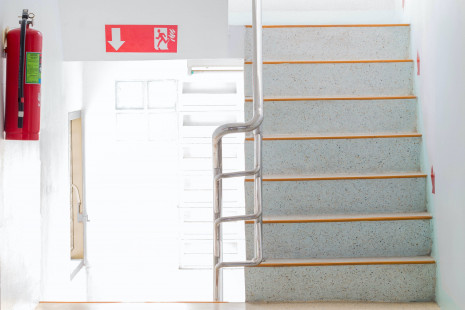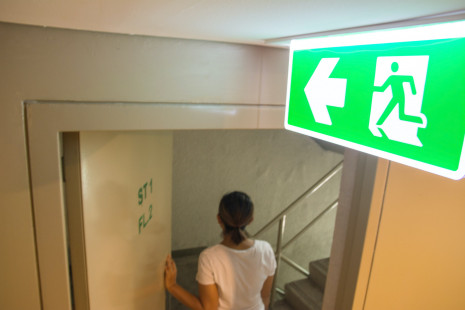Fire safety in blocks of flats
Most fires in blocks of flats start within the individual flats themselves. If you live in a purpose-built block of flats, or you are responsible for one, find out what you can do to prevent fires and keep residents safe.
Landlord responsibilities
Those responsible for the building, usually the owner, landlord or managing agent must comply with fire safety and housing legislation. There are several things you will need to do, such as assessing the risks in your building, putting in place fire safety measures and making sure your residents know what to do if there is a fire. For advice on assessing the fire risk, visit the fire risk assessment page.
The Fire safety in purpose-built blocks of flats (PDF, 2.91 MB, 192 pages) guidance helps those responsible for the building comply with their responsibilities under the Housing Act 2004 and the Regulatory Reform (Fire Safety) Order 2005.
For more information on safety in rented accommodation, including responsibility for smoke alarms, please visit the fire safety for tenants page.
The Government has published the Fire Safety (England) Regulations 2022, which will come into force on 23 January 2023 following the publication of supporting guidance which is due later this year.
The Regulations implement the majority of the recommendations made by the Grenfell Tower Inquiry in its Phase 1 report which required a change in the law and seek to improve the fire safety of blocks of flats in ways which are practical, cost effective for individual leaseholders and proportionate to the risk of fire.
More information on the Fire Safety (England) Regulations 2022, including a series of fact-sheets and an impact assessment, can be found at https://www.gov.uk/government/publications/fire-safety-england-regulations-2022
Resident responsibilities
Your landlord or managing agent must take steps to prevent fires breaking out in the communal areas and to protect escape routes. They should also give you instructions on what to do if a fire breaks out.
However, as a resident, there are things you should do to keep yourself and others safe - the most important of which is preventing fires from starting in the first place. Read our guidance on how to protect your home from fire and information on why fires start in the home. It is also important to ensure that everyone in your household is aware of the fire safety procedure in your block.
You should also help to keep escape routes clear and safe by:
- not obstructing the communal areas, which often form the fire escape route for the block
- not propping open fire doors in communal areas
- not cluttering the stairs, corridors and landings with personal items or things that can set fire easily
- not storing prams, bicycles or mobility scooters in communal areas without the permission of the landlord or agent
- not storing flammable materials in cupboards that have electrical circuits
- telling your landlord or agent if you see anything in the communal areas that does not belong there - or remove it
- putting all rubbish in the bins provided — do not leave it lying around in the refuse
- ensuring the self-closing device on your own front door works – your door should close automatically
What to do if there is a fire inside your flat
If there is a fire inside your flat, you should get out, stay out and call 999:
Don’t waste time investigating what’s happened or rescuing valuables.
Move as quickly but as safely as you can as you exit the building.
Close doors behind you to slow down the spread of fire and smoke. Make sure your flat front door is fully closed in particular.
What to do if there is a fire inside your block
If there is a fire in your block, you should call 999 immediately.
Purpose-built maisonettes or blocks of flats are usually built to give you some protection from fire. This means that walls, floors and doors can hold back flames and smoke for 30 to 60 minutes.
Unless you are affected by the fire or smoke, you are usually safer staying put – but only if your landlord has confirmed this is the correct approach for your building. When you call 999, make sure you tell the operator where you are and the best way to reach you.
Plan your escape
A planned and practised escape plan is very important - find out how to plan your escape. You should know how you will escape both your flat and the building.
If you, or anyone you live with, might find it difficult to escape in an emergency, you can book a free home safety visit with your local fire and rescue service.

